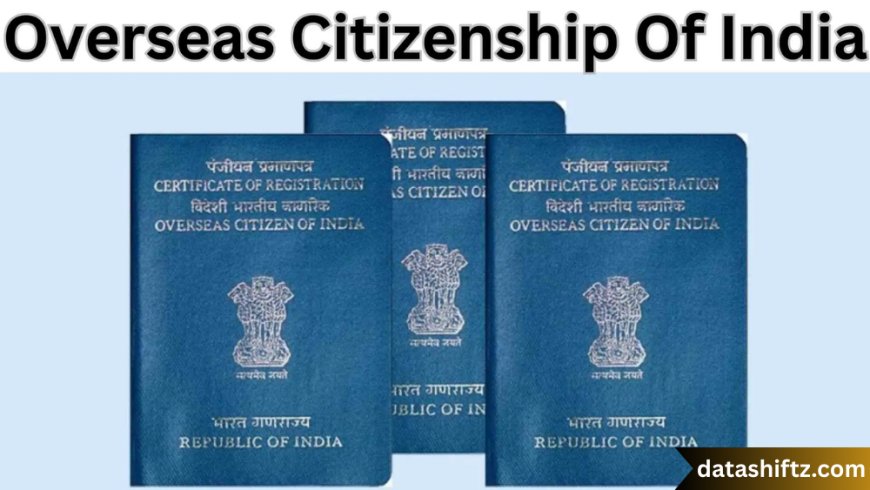Overseas Citizenship of India (OCI) – A Complete Guide

Introduction
The Overseas Citizenship of India (OCI) is a special immigration status offered by the Government of India to foreign nationals of Indian origin. While it is not full Indian citizenship, it grants several benefits that allow holders to live, work, and travel freely in India for an indefinite period.
The OCI scheme was introduced to maintain a strong connection between India and its global diaspora. For individuals of Indian ancestry who have settled abroad, OCI acts as a bridge to their roots, enabling them to enjoy certain rights and privileges without surrendering their foreign nationality.
In this detailed article, we’ll explore the history, eligibility, application process, benefits, restrictions, renewal, and FAQs related to the OCI card. We’ll also include tables for easy reference and lists to simplify complex rules.
History and Background
The OCI scheme was introduced in 2005 through an amendment to the Citizenship Act, 1955. Initially, it aimed to provide long-term visa facilities to Persons of Indian Origin (PIO), but in 2015, the PIO and OCI schemes were merged for greater convenience.
Who is Eligible for OCI?
Eligibility Criteria
According to the Citizenship (Amendment) Act, 2005, a person is eligible for OCI if they:
-
Were citizens of India at any time after January 26, 1950, or
-
Belonged to a territory that became part of India after August 15, 1947, or
-
Are children, grandchildren, or great-grandchildren of such a citizen, or
-
Are a minor child whose parents are Indian citizens, or
-
Are the spouse of an Indian citizen or OCI cardholder (subject to certain conditions).
Ineligibility Criteria
You cannot apply for OCI if:
-
You have ever been a citizen of Pakistan or Bangladesh.
-
Your parents or grandparents were citizens of Pakistan or Bangladesh.
-
You served in any foreign military that is considered sensitive by the Government of India.
Benefits of the OCI Card
| Benefit | Description |
|---|---|
| Multiple-entry visa | Lifelong visa to visit India multiple times without renewal. |
| No FRRO registration | No need to register with Foreigners Regional Registration Office. |
| Equal rights in property | Can purchase non-agricultural residential and commercial properties. |
| Employment benefits | Can work in India except in areas requiring special government clearance. |
| Education benefits | Eligible for admission in Indian institutions under NRI quota. |
Restrictions on OCI Card Holders
| Restriction | Details |
|---|---|
| No political rights | Cannot vote or contest elections in India. |
| No constitutional posts | Cannot hold positions like President, Prime Minister, Judge, etc. |
| No agricultural property purchase | Cannot buy agricultural land or farmhouses. |
| Certain jobs restricted | Cannot work in defense, space, nuclear research, or other sensitive sectors without permission. |
Application Process for OCI
Step-by-Step Procedure
-
Visit the official OCI website: https://ociservices.gov.in
-
Fill out the Part-A and Part-B online application forms.
-
Upload necessary documents (passport, birth certificate, proof of Indian origin).
-
Pay the application fee (varies by country).
-
Submit the application online and print it.
-
Send/submit the printed form with originals and copies to the nearest Indian Mission/Post.
-
Track your application status online.
Required Documents for OCI Application
| Document | Purpose |
|---|---|
| Current passport copy | Proof of identity and nationality. |
| Birth certificate | Proof of date and place of birth. |
| Indian origin proof | Passport copy of self/parents/grandparents or other documents. |
| Marriage certificate (if applicable) | For spouse-based OCI applications. |
| Photograph | As per government specifications. |
Processing Time and Fees
| Service | Time Taken | Fees |
|---|---|---|
| New OCI Application | 4–8 weeks | USD 275 (approx.) |
| OCI in lieu of PIO card | 4–6 weeks | USD 100 (approx.) |
| Miscellaneous services (renewal, update) | 4–6 weeks | USD 25–100 (approx.) |
Renewal and Updating of OCI Card
The OCI card is generally valid for lifetime, but updating is mandatory in certain cases:
When to Update OCI Card:
-
After getting a new passport before the age of 20 years.
-
Once after completing 50 years of age (if issued before 50).
-
If there are changes in personal details (name, nationality, etc.).
Advantages of Having an OCI Card
-
Freedom to travel to India anytime without visa hassles.
-
Long-term connection with India without losing foreign citizenship.
-
Eligibility for multiple benefits in education and business.
-
Easier property purchase and investment in India (non-agricultural).
-
No need for repeated FRRO visits.
-
Lifetime validity reduces paperwork and expenses.
Common Misunderstandings About OCI
-
OCI is not dual citizenship – it is a lifelong visa, not full Indian citizenship.
-
OCI holders cannot vote in Indian elections.
-
Agricultural land purchase is not allowed.
-
Employment in restricted sectors needs government clearance.
Comparison Between Indian Citizenship, OCI, and PIO (Old Scheme)
| Feature | Indian Citizen | OCI | PIO (Now merged) |
|---|---|---|---|
| Right to vote | Yes | No | No |
| Visa requirement | No | Lifetime visa | 15-year visa |
| Property rights | All properties | All except agricultural | All except agricultural |
| Government jobs | Yes | Limited | Limited |
| Duration of stay | Unlimited | Unlimited | 15 years validity |
Recent Updates on OCI Rules (2024–2025)
-
OCI cardholders can now participate in certain state-level entrance exams under NRI quota.
-
New digital portal for faster OCI card reissue and updates.
-
Enhanced security verification for spouse-based OCI applications.
Challenges Faced by OCI Cardholders
-
Delays in processing due to document verification.
-
Confusion between visa-free entry and actual citizenship rights.
-
Legal restrictions on certain property purchases.
-
Mandatory reissue in case of passport changes for minors and older applicants.
Conclusion
The Overseas Citizenship of India (OCI) scheme serves as a valuable link between India and its global diaspora. While it doesn’t offer full political rights, it provides lifetime visa-free travel, work, and residency privileges to eligible individuals of Indian origin.
For millions of people with Indian roots living abroad, the OCI card is a passport to reconnecting with their heritage while enjoying the security of their foreign nationality. By understanding its benefits, limitations, and processes, applicants can make the most of what OCI offers.





























